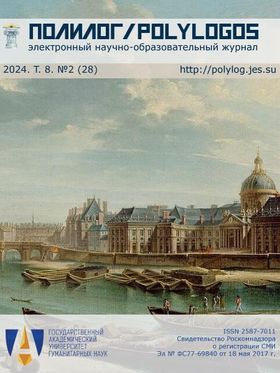
Share
The second issue of the journal Полилог/Polylogos for 2024 presents articles on the history of philosophy and socio-political thought, philosophy of Russian history, as well as the results of research in the field of applied political science and methodology of political knowledge.
Alexei Kara-Murza's article explores the role of the Scottish aristocrat Paul Menzies (Pavel Gavrilovich Menezius) (1637-1694) in the early education of the Russian reformist tsar Peter Alexeevich Romanov. In particular, it traces the history of the appearance of a Scottish northerner, who received a brilliant education in Europe, in the Moscow kingdom, his military and diplomatic career.
Artem Bezmenshchikov's article analyses the experience of applying the ontological model of the concretely universal in the systems of all-unity of English and Russian Neo-Hegelianism and Russian religious philosophy. Special attention is paid to the strengths and weaknesses of the author's solutions from the point of view of increasing the heuristic potential of the logic of universality for anthropological and socio-philosophical explications.
The subject of Alexander Vukolov's article is the concept of nation of the Italian political thinker and revolutionary G. Mazzini (1805-1872) in the context of the activities of the association "Young Italy" ("Giovine Italia"; 1831-1834) created by him.
The article by Antonina Selezneva and Nikolai Skipin attempts to comprehend "traditional" and "traditional values" as scientific categories. The main research focus is related to the definition of the semantic content of the categories in question; attention is also paid to various approaches to the empirical study of traditional values.
Vladimir Krotkov's article examines the determinants that determine the dynamics of modern international relations and their institutional metamorphosis. The author focuses on the actors of world politics and international relations, whose influence can be measured by resource capabilities and limitations.
Roman Savenkov and Daria Shcheglova in their article analyse the results of statistical analysis of the voting results of the Voronezh region voters in six elections of the President of Russia in the period 2000-2024. Based on the results of the study, the authors prove that the type of territory significantly affects the election results, the level of turnout and the degree of protest voting.
Ekaterina Shekhovtsova's article was published in the book reviews section: the author considers some aspects of a new methodological approach to the study of classical Eurasianism on the example of the book by historian of Russian philosophy Rustem Vakhitov "Eurasianism: Logos. Eidos. Symbol. Myth."
